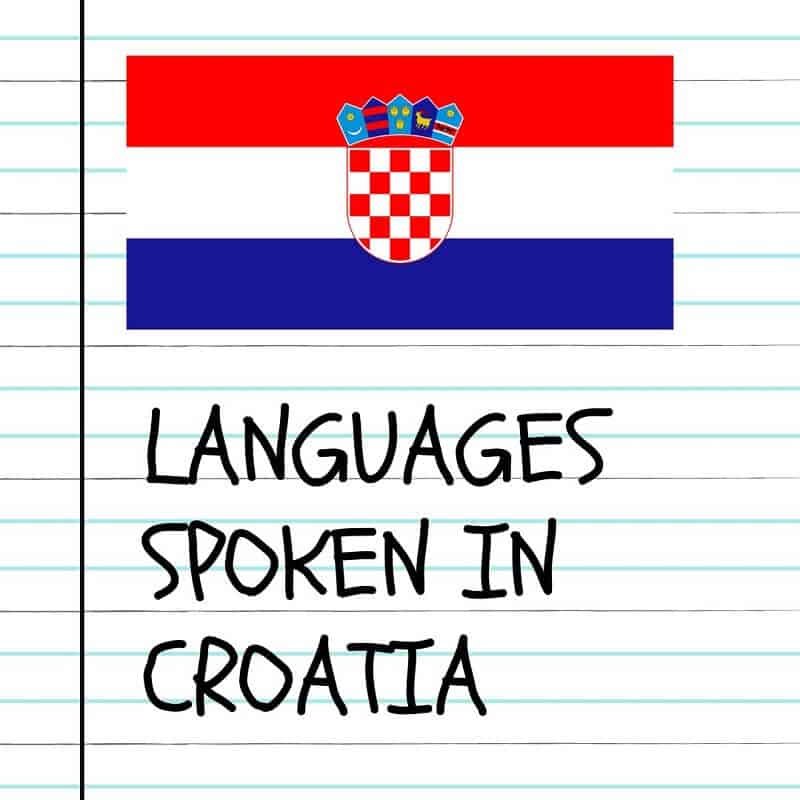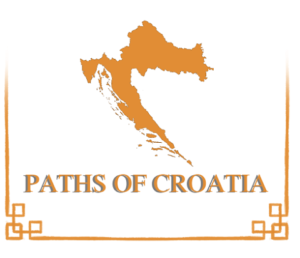
Croatia is a state where people learn English from a young age, speak Croatian as their mother language, and understand plenty of surrounding nations as all Slavic languages have plenty in common.
Croatian is the main tongue in Croatia, but English, Italian, and German are popular foreign languages spoken in Croatia. According to one pool, almost 75% of Croats aged 25-64 speak another language along with their mother tongue, with as many as 60% of people speaking English.
If you pay Croatia a visit, you’ll easily communicate in English, and if you decide to learn some Croatian or perhaps even Serbian or Bosnian you’ll have an easy time here.
So, let’s see what can be said about the languages spoken in Croatia!
I’ll also try to explain some questions you might have regarding dialects, give you real-life examples, and more.
Most popular languages spoken in Croatia
English
According to the pool I earlier mentioned, 60% of Croats can speak and write English, and that really stands ground in reality.
English is spoken in every urban region in Croatia, so almost everyone will be able to keep at least a basic communication in English with you.
If you venture into more rural areas, small cities where not many tourists come you’ll naturally see a decline in the spoken English language but you’ll always be able to find someone who can speak English, that’s the fact.
This especially applies to younger generations as English is the mandatory language we learn in schools starting from a young age.
Italian
From the region of Istria to Dalmatia, Italian influence can be seen in cuisine, tradition, and language.
Italian is spoken by many folks by the shore, and most elementary and high schools have the Italian language in their curriculum.
Moreover, you’ll find many Italian words in the Croatian dialects such as Chakavian and many Italian words can be found in the vocabulary of standard Croatian speakers who were raised by the shore.
To this day, it’s not unusual for me to figure out for the first time that the words I use have obvious Italian roots.
German
German is alongside English and Italian, among the most spoken foreign languages in Croatia.
Just like was the case with Italia, Germany also left a strong influence throughout history in many Croatian regions, so it’s common for folk to be pretty profound of German.
Moreover, Germany was always the number one choice for working abroad as the wages and job standards have always been higher than for many similar jobs in Croatia.
Thus, many people have someone who lives or lived in Germany and returned to their motherland when they got situated.
Slavic languages
Croatian is the most spoken Slavic language in Croatia, but it’s important to notice that Serbian and Bosnian languages are so similar to Croatian that It’s difficult to consider them different languages, although by the definition that’s what they are.
Both, Serbian and Bosnian languages are spoken in Croatia and that’s not only because there are only minor differences in the dictionary that set them apart, but both the Serbs and Bosnians live in Croatia as minority citizens.
Moreover, there is also Slovenian which is another Slavic language, and while it can be understood if you speak Croatian, it’s not as similar as Serbian and Bosnian are to Croatian.
About Croatian Dialects
There are 3 dialects in Croatia, the Shtokavian, the Chakavian, and Kajkavian.
The Shtokavian is the standard Croatian dialect which is the easiest to understand by nearby nations, but Chakavian and Kajkavian have plenty of words that are even difficult for some Croatian natives to grasp.
Chakavian is spoken in the area of Istria, Kvarner, and Dalmatia and on the islands. Not all Chakavian dialect spoken in the mentioned areas is identical neither but has the same base.
The same can be said for Kajkavian, but Kajkavian is spoken in continental Croatia in the area around Zagreb with the exception of Slavonia where Shtokavian is the main dialect.
However, in any popular tourist area including all bigger cities and towns in Croatia, everyone speaks Shtokavian so you don’t have to worry that you won’t be able to communicate if you learned the standard, Croatian language based on Shtokavian.
How do Serbian and Bosnian differ from Croatian?
Well, if you speak Croatian everyone in Serbia and Bosnia will understand you almost perfectly, and vice versa.
However, this mostly applies to the standard Croatian language based on the Shtokavian dialect that is spoken in Croatia.
If someone would speak in other dialects such as Chakavian or Kajkavian, the Serbian and Bosnian speakers wouldn’t understand more than half of what is spoken.
How well would Serbs and Bosnians understand these dialects depends on how old they are, as the older generations who used to live with Croatians in Yugoslavia certainly know more about Croatian dialects than newer generations.
If you know Serbian or Bosnian, you don’t have to worry about understanding people in Croatia and you’ll be able to easily run a conversation everywhere with only possible minor misunderstandings.
One of my best friends is Bosnian and only sometimes do we get into a misunderstanding because We use words that are unique to the region we come from.
For instance, I live in Rijeka and there’s a certain influence of the Italian language that is a normal part of my vocabulary as the native of Rijeka, so sometimes I may call a plate “pijat” which is common by the coast and comes from Italian “piatto”, while I could easily use the standard Croatian word for a plate, “tanjur” and Bosnians and Serbs would easily understand me as my Serbian and Bosnians friends use the same word.
And finally, the Croatian language is written using the Latin alphabet while the Serbian language is written using the Cyrillic alphabet, and you’ll find a combination of both in Bosnian.
If you are feeling confused by now, I am really sorry.
How difficult is it to learn Croatian?
According to Foreign Service Institute, Croatian fits in the IV Category of languages with significant linguistic and/or cultural differences from English.
This puts Croatia in the same category with languages such as Bosnian, Serbian, Bulgarian, Hungarian, Slovenian, Ukrainian, Greek, Hebrew, Mongolian, Turkish, and Vietnamese.
In my opinion, Croatian is a very logical language and if you learn to speak Croatian you can immediately speak Serbian and Bosnian and with some small additional work at least understand some Slovenian and other Slavic languages such as Ukrainian, and Russian. This, in my opinion, makes learning Croatian totally worthwhile if you are keen on Slavic languages.
I mean, how cool would be to say you speak 3 new languages and you only spent time and energy learning one?
Moreover, if you plan a trip to Serbia or Bosnia one day, you’ll easily catch up with the natives and easily upgrade your vocabulary with the words unique to the regions.
